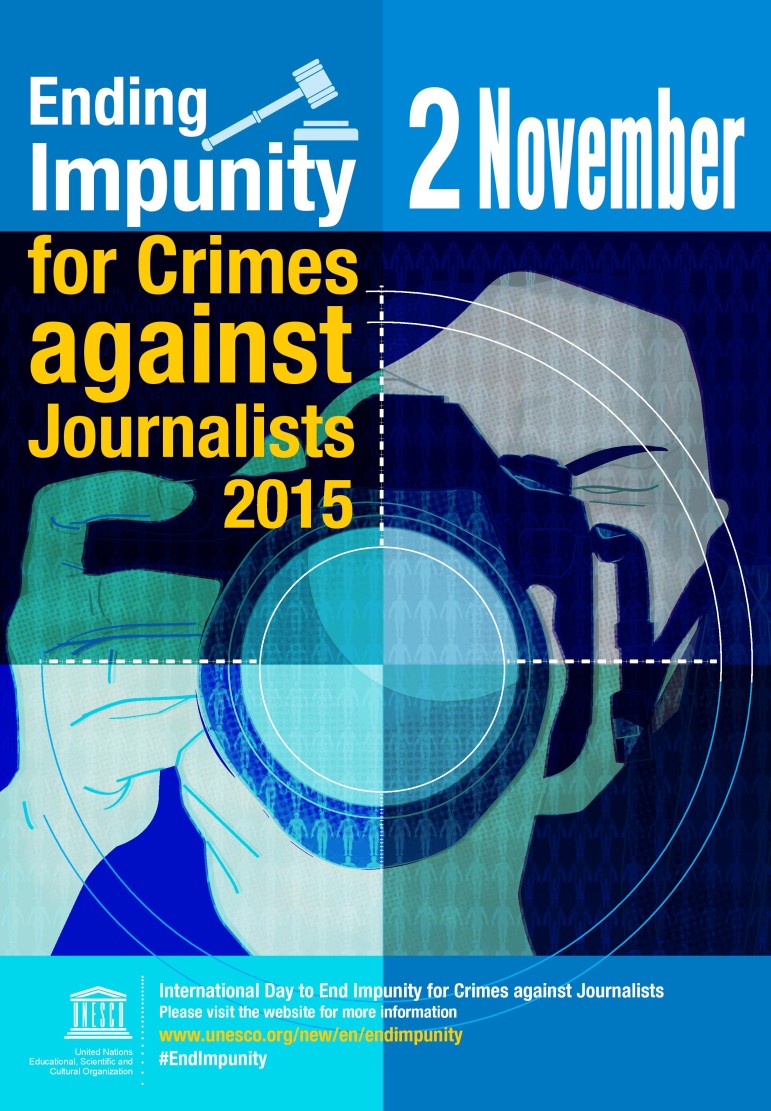 “Impunity is poisonous…
“Impunity is poisonous…
It leads to self-censorship for fear of reprisal, depriving society of even more sources of significant information… I urge States to take all the necessary measures – through legislation, protection mechanisms, and new adequate resources – to ensure that investigations and trials relating to crimes against journalists are undertaken. I urge everyone to stand up on November 2 and demand that the rule of law is fully applied when journalists are attacked and killed in the line of duty.”
UNESCO Director-General Irina Bokova
There is a war on journalism, and those attacking us are literally getting away with murder. Over the past decade more than 700 journalists worldwide have been killed — and less than one in ten of those cases have been solved. On average, a journalist is killed every five days while practicing his or her profession.
Join your colleagues this November 2 for International Day to End Impunity for Crimes against Journalists. There will be events around the world spearheaded by UNESCO, the UN agency with a mandate to defend freedom of expression and press freedom.
Journalists doing investigative reporting often bear the brunt of these attacks. On October 8 at the Global Investigative Journalism Conference in Lillehammer, Norway, journalists from 121 countries stood in unison to support the following declaration on safety and impunity:
THE LILLEHAMMER DECLARATION
Given the extraordinary levels of harassment, persecution, imprisonment, and violence directed against investigative journalists and their colleagues worldwide;
Given the widespread impunity among those who employ these measures;
And given the significant contributions made by investigative journalists to exposing corruption, organized crime, abuse of power, and lack of accountability, and to strengthening civil society;
Be it resolved that the attendees of the 9th Global Investigative Journalism Conference, representing 121 countries, demand that governments, multilateral agencies, and authorities worldwide prioritize the protection of journalists and an end to impunity for those who attack us.
For resources on how to cope with safety and security, check out these links from GIJN’s Resource Center:
- Covering Street Protests: Covering public protests involves risks that journalists should prepare for. Brazil’s Association of Investigative Journalism (Abraji) developed this guide, packed with tips from pros who have experienced risky incidents at demonstrations.
- Digital Security: Ensuring your digital files and communications are secure has never been more important. Here are some straightforward guidelines, tip sheets, and tutorials.
- Emergency Aid for Journalists: A number of organizations provide emergency support to journalists in danger. Assistance ranges from medical and legal aid to moving a targeted journalist out of the country. Spanish version here.
- Legal Defense: Here are several well-established groups that specialize in getting legal assistance for journalists.
- Safety and Security Organizations: This guide, adapted from the Center for International Media Assistance, lists major international press freedom and safety groups that concern themselves, in some fashion, with violent attacks on journalists. Spanish version here.
Videos
Investigative Journalism Under Attack
How Can We Better Protect Investigative Reporters?
Investigative Journalism Under Threat: These Global Shining Light Award Finalists were recently honored for investigative reporting in countries while under threat or duress.

